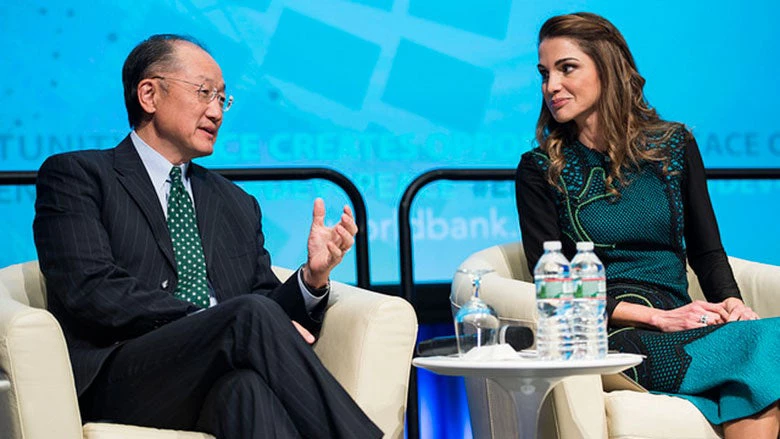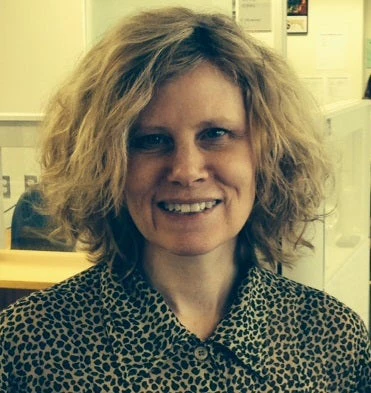Jordan’s Queen Rania and other high-ranking officials said Friday that the world needs a new approach to deal with historically high numbers of forcibly displaced people.
“This is a global crisis, and we’re deluding ourselves if we think it can be contained,” the queen said at the World Bank Group-IMF Spring Meetings, where forced displacement is a top issue on the agenda amid a refugee crisis that has spread from the Middle East into Europe over the last year.
Queen Rania said Jordan has received 1.3 million Syrian refugees over the past five years. The influx has been a “demographic shock that is exhausting our social and physical infrastructure to its absolute limits,” she said. International contributions have made up less than a third of Jordan’s expenses.
“There is a cost to depriving people of the tools to make the most of their own lives, one that our global community is already paying. And if we don’t invest in them now, the bill of our neglect will only rise. Make no mistake, we, too, are operating on borrowed time, because the status quo is unsustainable.”
The queen spoke during a livestreamed event, Forced Displacement: A Global Development Challenge, co-hosted by the World Bank Group and the office of the United Nations High Commissioner for Refugees (UNHCR) and moderated by the BBC’s Stephen Sackur.
World Bank Group President Jim Yong Kim said the issue has forced the institution to fundamentally rethink its work. He said the Bank needs to create a new model and work more closely with humanitarian partners like the UN to effectively address the problem.
“We are now understanding in a way we never have before that we have to change,” he said. “We can no longer wait for the humanitarian experts to do their work while we enter later, at some point, with our long term solutions after months or sometimes even after years. We know we can no longer wait as countries implode and say, well, this is not our job.”
Forced displacement occurs when people are forced to leave their homes because of civil war, other violence or conflict, and because government cannot protect people or provide services.
While the situation in the Middle East is serious, displacement is a global challenge affecting many developing countries. “When you grow up in a refugee camp for 25 years, where is home?” asked Somalia’s Minister of Women and Human Rights, Zahra Ali Samantar.
“Emergency relief is the immediate need, but we have to plan in the long term,” she said. “When we destroy women and children’s lives, we destroy the future of the country.”
UN Secretary-General Ban Ki-moon said we are facing the biggest displacement and refugee crisis of our time, and half of the refugees are children.
“We must respond to this monumental crisis with monumental solidarity,” said Ban, adding that the World Humanitarian Summit next month will focus on the root causes of displacement and help determine the global response.
Of the nearly 5 million Syrian refugees registered by UNHCR, 2.1 million live in Jordan and Lebanon, seriously straining their resources. UNHCR has provided assistance but does not have adequate resources, said UN High Commissioner for Refugees Filippo Grandi. About 70% of the aid agency’s funding comes from only eight donors, he said.
Lebanon’s minister of education, Elias Bou Saab, said international community has helped Lebanon, but the assistance has fallen short of the needs for several years in a row. “Every year that goes by…is a year wasted.”
“I would urge the international community to act fast,” said Saab.
The spread of the refugee crisis has forced Europe to see the world around it, said European Commission President Jean-Claude Juncker.
“Migration is one of the defining challenges of our 21st century. We will be defined by how we respond,” he said.
David Miliband, president of the International Rescue Committee and former UK secretary of state for foreign affairs, said the “most significant thing about this conversation …is that we are talking not just about more aid, we’re talking about better aid.”
That includes jobs and opportunities for refugees to get an education and become part of the economy. The Bank Group is using innovative financial tools to build a special economic enterprise zone to create thousands of jobs for Syrian refugees and their Jordanian hosts, and is also working with Lebanon to make sure all children in the country — Lebanese and Syrian alike — are going to school.
The private sector can also make a difference in fragile and conflict situations by helping economies to function, said Unilever CEO Paul Polman.
“I think everybody knows what needs to be done, what needs to be implemented, but the speed of things is not there,” he said.
“If the private sector doesn’t positively contribute to making this world work, we don’t have a long-term future either.”



Join the Conversation